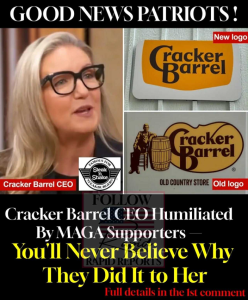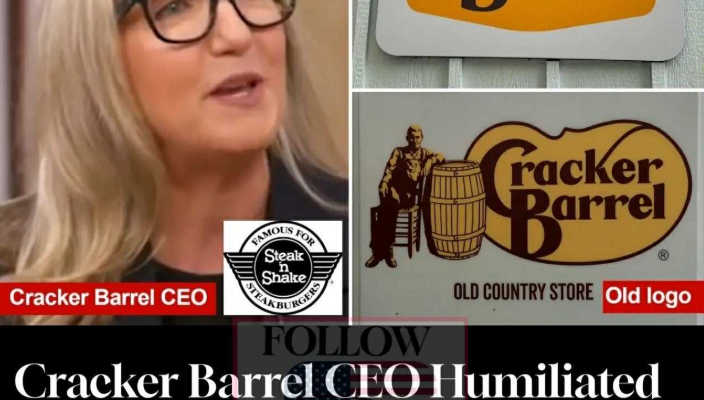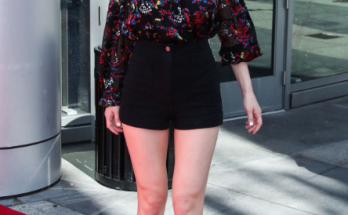Here’s a detailed breakdown of the Cracker Barrel controversy that’s stirred up headlines and social media feeds alike—especially among MAGA supporters. Buckle up, because this story is a wild ride through branding, backlash, and the culture wars of corporate America.
🧨 The Spark: A Logo Change That Lit a Fire
Cracker Barrel, the Southern-themed restaurant chain known for its rustic charm and nostalgic Americana, recently unveiled a new logo. The redesign removed the iconic image of a man in overalls (nicknamed “Uncle Herschel”) leaning on a barrel—a symbol that had been part of the brand since 1977.
The new logo is minimalist: just the words “Cracker Barrel” on a gold background, with a sleeker barrel shape. According to the company, the change was meant to modernize the brand while staying true to its roots.
But for many MAGA supporters, this wasn’t just a design update—it was a cultural betrayal.
🔥 MAGA Meltdown: “Woke” Accusations Fly
The backlash was swift and intense. Prominent right-wing commentators like Benny Johnson and Donald Trump Jr. slammed the redesign, calling it “woke,” “boring,” and “depressing”. Johnson even declared, “White people are about to riot,” referencing the removal of the white man from the logo.
The outrage wasn’t limited to social media. MAGA influencers compared Cracker Barrel’s move to other corporate decisions they’ve criticized—like Bud Light’s partnership with a trans influencer or Target’s Pride merchandise. Some called it Cracker Barrel’s “Bud Light moment,” warning of financial collapse due to alienating their core customer base.
📉 Financial Fallout: $94 Million Gone in a Day
The fury wasn’t just rhetorical—it hit Cracker Barrel’s bottom line. The company’s stock dropped by over 7% in a single day, wiping out approximately $94 million in market value. At one point, the stock was down nearly 15% before recovering slightly by the closing bell.
This dramatic dip was interpreted by many as a direct result of the MAGA backlash. Whether or not that’s entirely true, the timing certainly suggests a correlation.
🗣️ CEO Under Fire: Julie Felss Masino Responds
Cracker Barrel’s CEO, Julie Felss Masino, found herself at the center of the storm. Critics accused her of steering the company into “woke” territory, citing not just the logo change but also past decisions like installing rainbow rocking chairs during Pride Month.
Masino defended the rebrand, saying the feedback had been “overwhelmingly positive” and that the company was trying to evolve while preserving its core identity. She emphasized that the character of Uncle Herschel would still appear in menus, stores, and signage—even if he was no longer part of the logo.
Still, many MAGA supporters weren’t buying it. To them, the change symbolized a broader cultural shift they oppose: the erasure of traditional American imagery in favor of sanitized, corporate-friendly aesthetics.
🏛️ Culture War Symbolism: More Than Just a Logo
Why did this logo change provoke such a strong reaction? It’s not just about branding—it’s about identity.
Cracker Barrel has long been seen as a bastion of “old America,” a place where country music plays, biscuits are served with gravy, and the décor evokes a bygone era. For many conservatives, it represents comfort, tradition, and a simpler time.
Removing the man from the logo felt, to them, like erasing that legacy. It wasn’t just a design tweak—it was a political statement. And in today’s polarized climate, even a logo can become a battleground.
🧭 What’s Next for Cracker Barrel?
Despite the backlash, Cracker Barrel is standing by its new look. The company insists that the rebrand is part of a broader effort to refresh its image and attract new customers while keeping longtime fans happy.
Whether that strategy will work remains to be seen. The financial hit was real, and the cultural blowback may linger. But Cracker Barrel is betting that its food, atmosphere, and hospitality will ultimately win people over.
🧠 Final Thoughts: A Lesson in Branding and Identity
This saga is a case study in how deeply intertwined branding and cultural identity have become. A logo isn’t just a logo—it’s a symbol of values, history, and belonging.
For Cracker Barrel, the challenge now is to navigate that terrain without losing the trust of its most loyal patrons. And for the rest of us, it’s a reminder that even the smallest changes can spark the biggest debates.
If you want, I can turn this into a full editorial, a social media post, or even a satirical piece. Just say the word.

